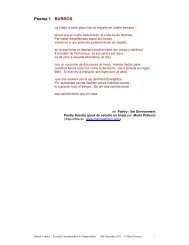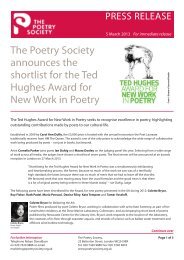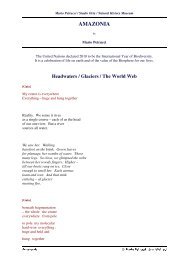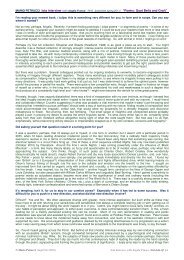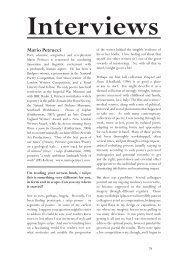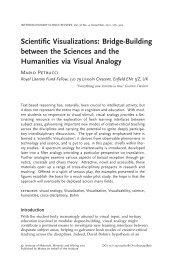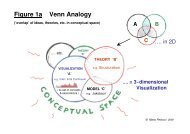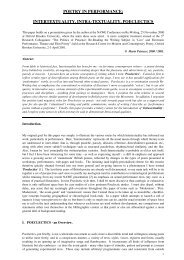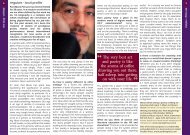Create successful ePaper yourself
Turn your PDF publications into a flip-book with our unique Google optimized e-Paper software.
• How is crude oil created in <strong>the</strong> earth? Ultimately, where does <strong>the</strong> energy locked in oil (and<br />
natural gas) come from? In <strong>the</strong> latter parts of <strong>the</strong> poem, what imagery is used to describe this<br />
fact? Is it effective?<br />
• When does a desert get very cold? How is this related (in <strong>the</strong> poem’s closing stages) to our<br />
use of oil? In <strong>the</strong> final few lines, are we offered little more than impending doom, or are<br />
certain words used to suggest that <strong>the</strong> sun (which made all <strong>the</strong> oil in <strong>the</strong> first place) might<br />
offer a way out of our predicament? Are both of <strong>the</strong>se interpretations present in <strong>the</strong> poem?<br />
Do you think <strong>the</strong> poet intends that and, if so, why?<br />
Follow-up. How can society prepare for oil shortages? What are <strong>the</strong> benefits of doing so, well in<br />
advance? Starting with <strong>the</strong> clue in line 13 (“I could have driven too but walked”) what can each of<br />
us do to help?<br />
Support for Theme C: Deforestation<br />
This trio of poems explores different kinds of loss associated with our estrangement from forests and<br />
<strong>the</strong> destruction of trees.<br />
‘Sapling’ paints an image of childlike innocence and connection with nature under imminent threat<br />
(from urban-based education?). Longstanding familiarities with woodland – its sensual richness, <strong>the</strong><br />
calm and insight it can bring (“A cuckoo’s woodwind/ sounds him out”) – are all contrasted with a move<br />
to <strong>the</strong> modern adult world that will “put a stop to all this// nonsense”. The poem shifts into a sense of<br />
foreboding, of deep isolation (for both child and forest) symbolised by <strong>the</strong> “solitary bark” and that<br />
closing, mechanical sound of a woodman’s axe.<br />
‘Dodona’ is set in <strong>the</strong> future and tells <strong>the</strong> story of <strong>the</strong> last oak tree on <strong>the</strong> planet, kept on “life support”<br />
by technical apparatus as part of a public show. With its death, something utterly profound is<br />
irretrievably lost. Before studying this poem in class, do a little research on Dodona (<strong>the</strong> ancient Greek<br />
oracle associated with <strong>the</strong> oak tree): what was it, and how was it consulted? Any convenient source<br />
will do: a mythology book in a library, Google, etc. Make sure you can shed light on o<strong>the</strong>r references<br />
such as “chimaera” and “world tree”, if needed. The loss described in this poem is slow and agonising:<br />
<strong>the</strong> oak’s extinction sparks an archetypal and spiritual disaster.<br />
‘Deserted’ opens with <strong>the</strong> irony of concreted areas and asphalt strips (designed for cars) being called<br />
Greens, Walks or Roads (check <strong>the</strong> equestrian origins of ‘Road’). Humanity, facing judgement, is stuck<br />
in impotent denial (“The asphalt/ wasn’t mine”). The poem moves irresistibly towards a hellish and<br />
barren vision in which entire planets succumb to urban sprawl. Toge<strong>the</strong>r, <strong>the</strong> poem’s title and <strong>the</strong> phrase<br />
“I fossilize” suggest that <strong>the</strong> loss here is total: our species; life itself.<br />
Support for Theme D: Gaia<br />
Life as <strong>the</strong> real worldwide web.<br />
According to James Lovelock’s Gaia hypo<strong>the</strong>sis, <strong>the</strong> living/ non-living components of <strong>the</strong> Earth form<br />
a complex, self-regulating system that behaves, in a sense, like a single global organism. These<br />
poems explore various aspects of our relationship to/with Gaia. Are we really heading for global<br />
extinction (‘Exposures’)? Who supplies our images of apocalypse and, if it does come, might it be in<br />
a manner few of us expect? How can we gain a global harmony echoed (in ‘Pangaea’) by that time<br />
when <strong>the</strong> continents (find visual aids for this) were one, snug-fitting mass? Who, or what, is asking<br />
<strong>the</strong> (unspecified) “insistent/ question”, and what might it be about? What does <strong>the</strong> story in <strong>the</strong> third<br />
poem (‘that guy—a’) suggest about humanity’s importance to Gaia? Do we need to change, rapidly?<br />
Is our collective behaviour reflecting that need? (Fur<strong>the</strong>r notes and ideas for this poem follow.)<br />
Reading and Discussion.<br />
that guy—a (fur<strong>the</strong>r notes)<br />
This poem seems to tell <strong>the</strong> story of a holiday night-time jaunt that somehow goes wrong. Invite a<br />
paraphrase, or summary, of what is happening. Does everyone agree with it? Be sure, en route, to<br />
discuss <strong>the</strong> possible meanings of any strange or striking phrases, such as “black-&-whites” (line 9)<br />
and “November’s guy” (line 21).



